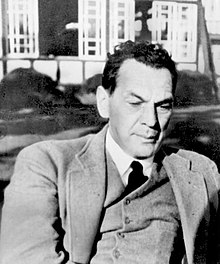
Back ريخارد زورغه Arabic ريخارد زورجه ARZ Rixard Zorge Azerbaijani Richard Sorge BAR Рыхард Зоргэ Byelorussian Рихард Зорге Bulgarian Richard Sorge Catalan Richard Sorge Czech Рихард Зорге CV Richard Sorge Danish
Richard Sorge | |
|---|---|
 Sorge in 1940 | |
| Nickname(s) | Ramsay |
| Born | 4 October 1895 Baku, Baku Governorate, Caucasus Viceroyalty, Russian Empire (now Baku, Azerbaijan) |
| Died | 7 November 1944 (aged 49) Sugamo Prison, Tokyo, Empire of Japan |
| Allegiance | |
| Service/ | Imperial German Army Soviet Army (GRU) |
| Years of service | Germany 1914–1916, USSR 1920–1941 |
| Awards | Hero of the Soviet Union Order of Lenin Iron Cross, II class (for World War I campaign) |
| Spouse(s) | Christiane Gerlach (1921–1929), Ekaterina Alexandrovna (1929(?)–1943) |
| Relations | Gustav Wilhelm Richard Sorge (father) Friedrich Sorge (great-uncle) |
Richard Sorge (Russian: Рихард Густавович Зорге, romanized: Rikhard Gustavovich Zorge; 4 October 1895 – 7 November 1944) was a German journalist and Soviet military intelligence officer who was active before and during World War II and worked undercover as a German journalist in both Nazi Germany and the Empire of Japan. His codename was "Ramsay" (Рамза́й).
Sorge is known for his service in Japan in 1940 and 1941, when he provided information about Adolf Hitler's plan to attack the Soviet Union. Then, in mid-September 1941, he informed the Soviets that Japan would not attack the Soviet Union in the near future. A month later, Sorge was arrested in Japan for espionage.[1][2] He was tortured, forced to confess, tried and hanged in November 1944.[3] Stalin declined to intervene on his behalf with the Japanese.[3]
He was posthumously awarded the title of Hero of the Soviet Union in 1964.[3]
- ^ Варшавчик, Сергей (Varshavchik, Sergey) (4 October 2015). "Рихард Зорге: блестящий разведчик, влиятельный журналист" [Richard Sorge: brilliant intelligence agent, influential journalist]. RIA Novosti (in Russian). Retrieved 4 January 2020.
{{cite news}}: CS1 maint: multiple names: authors list (link) - ^ "'Гении разведки': вышла новая книга о тех, кто добывал секреты для России" ['Intelligence geniuses': a new book about those who mined secrets for Russia was published]. RIA Novosti (in Russian). 17 January 2019. Retrieved 4 January 2020.
- ^ a b c Simkin, John (January 2020). "Richard Sorge". Spartacus Educational.